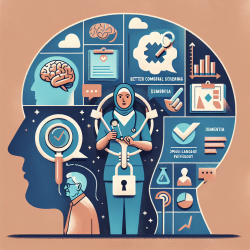Understanding the Connection Between Diet and Depression in Adolescent Girls
As speech-language pathologists, we are often focused on improving communication and cognitive outcomes in children. However, understanding the broader context of a child's life, including their mental health, is crucial for holistic development. A recent study titled "Association between dietary behaviors and depression in adolescent girls" provides valuable insights into how dietary habits can influence mental health, particularly depression, in adolescent girls.
Key Findings from the Research
The study, conducted with 933 Iranian adolescent girls aged 12 to 18, explored the relationship between dietary behaviors and depression scores. The findings revealed significant associations between certain eating habits and depression levels:
- Main Meal Consumption: Regular consumption of main meals was inversely related to depression scores. This suggests that skipping meals may increase the risk of depression.
- Snack Consumption: Regular snacking was also found to be inversely associated with depression, indicating that consistent energy intake throughout the day might help stabilize mood.
- Food Chewing: Proper chewing of food was linked to lower depression scores, highlighting the importance of mindful eating practices.
- Intra-meal Fluid Intake: High frequency of drinking fluids during meals was initially associated with higher depression scores, although this association diminished after adjusting for other variables.
- Spicy Foods: Consumption of spicy foods showed a direct association with depression in initial models, but this relationship was not significant in fully adjusted models.
Implications for Practice
For practitioners, these findings underscore the importance of considering dietary habits when assessing and treating depression in adolescents. Here are some practical steps to integrate these insights into your practice:
- Holistic Assessment: Include questions about dietary habits in your assessments to gain a comprehensive understanding of the child's lifestyle.
- Collaboration with Nutritionists: Work with nutritionists to develop dietary plans that support mental health alongside speech and language therapy goals.
- Education and Advocacy: Educate families about the importance of regular meals and mindful eating. Advocate for school programs that promote healthy eating habits.
Encouraging Further Research
While this study provides valuable insights, it also highlights the need for further research to explore the causal relationships between diet and depression. Prospective studies could help clarify these associations and inform more effective interventions.
To read the original research paper, please follow this link: Association between dietary behaviors and depression in adolescent girls.










